2007 Schedule
May 26 |
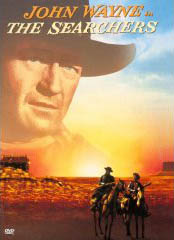 |
The Searchers. A favorite film of some of the world's greatest filmmakers, including Martin Scorsese and Steven Spielberg, John Ford's The Searchers has earned its place in the legacy of great American films for a variety of reasons. Perhaps most notably, it's the definitive role for John Wayne as an icon of the classic Western--the hero (or antihero) who must stand alone according to the unwritten code of the West. The story takes place in Texas in 1868; Wayne plays Ethan Edwards, a Confederate veteran who visits his brother and sister-in-law at their ranch and is horrified when they are killed by marauding Comanches. Ethan's search for a surviving niece (played by young Natalie Wood) becomes an all-consuming obsession. With the help of a family friend (Jeffrey Hunter) who is himself part Cherokee, Ethan hits the trail on a five-year quest for revenge. At the peak of his masterful talent, director Ford crafts this classic tale as an embittered examination of racism and blind hatred, provoking Wayne to give one of the best performances of his career. |
| June 9 |
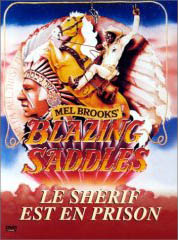 |
Blazing Saddles. Mel Brooks scored his first commercial hit with this raucous Western spoof starring the late Cleavon Little as the newly hired (and conspicuously black) sheriff of Rock Ridge. Sheriff Bart teams up with deputy Jim (Gene Wilder) to foil the railroad-building scheme of the nefarious Hedley Lamarr (Harvey Korman). The simple plot is just an excuse for a steady stream of gags, many of them unabashedly tasteless, that Brooks and his wacky cast pull off with side-splitting success. The humor is so juvenile and crude that you just have to surrender to it; highlights abound, from the lunkheaded Alex Karras as the ox-riding Mongo to Madeline Kahn's uproarious send-up of Marlene Dietrich as saloon songstress Lili Von Shtupp. Adding to the comedic excess is the infamous campfire scene involving a bunch of hungry cowboys, heaping servings of baked beans and, well, you get the idea. |
| July 7 |
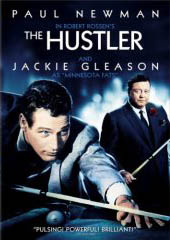 |
The Hustler. Paul Newman shines as cocky poolroom hustler "Fast" Eddie Felson in Robert Rossen's atmospheric adaptation of the Walter Tevis novel. Newman's Felson is a swaggering pool shark punk who takes on the king of the poolroom, Minnesota Fats (a cool, assured Jackie Gleason in his most understated performance). After losing big and crashing into a void of self-pity, Eddie meets down-and-out Sarah (Piper Laurie), an alcoholic blue blood who's dropped into Eddie's world of dingy bars and seedy poolrooms. Eddie regains his confidence and attracts the attention of a shifty, calculating promoter, Bert Gordon (George C. Scott), who offers to bring Eddie into the big money--but at what cost? Rossen brings his film to life with the easy pace of a pool game, giving his actors room to explore their characters and develop into a razor-sharp ensemble. Eugen Schüfftan earned an Academy Award for his shadowing black-and-white cinematography, as did art directors Harry Horner and Gene Callahan for their deceivingly simple set designs. Even in the daylight this film seems to be smothered by night, lit by the dim glow of a bar lamp or the overhead glare of a pool-table light, an appropriate environment for this tale of one man's struggle with his soul and his self-esteem. Newman returned as an older, wiser, cagier Felson 25 years later in Martin Scorsese's Color of Money. |
| July 21 |
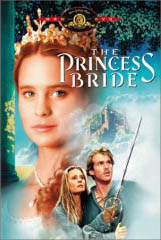 |
The Princess Bride. Screenwriter William Goldman's novel The Princess Bride earned its own loyal audience on the strength of its narrative voice and its gently satirical, hyperbolic spin on swashbuckled adventure that seemed almost purely literary. For all its derring-do and vivid over-the-top characters, the book's joy was dictated as much by the deadpan tone of its narrator and a winking acknowledgement of the clichés being sent up. Miraculously, director Rob Reiner and Goldman himself managed to visualize this romantic fable while keeping that external voice largely intact: using a storytelling framework, avuncular Grandpa (Peter Falk) gradually seduces his skeptical grandson (Fred Savage) into the absurd, irresistible melodrama of the title story.
The wild and woolly arcs of the story, the sudden twists of fate, and, above all, the cartoon-scaled characters all work because of Goldman's very funny script, Reiner's confident direction, and a terrific cast. Elwes and Wright, both sporting their best English accents, juggle romantic fervor and physical slapstick effortlessly, while supporting roles boast Mandy Patinkin (the swordsman Inigo Montoya), Wallace Shawn (the incredulous schemer Vizzini), and Christopher Guest (evil Count Rugen) with brief but funny cameos from Billy Crystal, Carol Kane, and Peter Cook. |
| August 4 |
 |
Witness. When Samuel (Lukas Haas), a young Amish boy traveling with his mother Rachel (Kelly McGillis), witnesses the murder of a police officer in a public restroom, he and his mother become the temporary wards of John Book (Harrison Ford), a detective who's been assigned to solve the crime. After suspect lineups and mug-shot books yield nothing, Samuel, in the most memorable scene of the film, recognizes the murderer as a narcotics agent whose picture he sees in the precinct. Once Book realizes that the police chief is in on it, too, he whisks Samuel and Rachel back home to Amish country, where he himself goes into hiding as a plain Amish man. The juxtaposition between the life of the Amish and the violence of inner-city police corruption work surprisingly well for the story, and Kelly McGillis as the falling in love widow gives an almost perfect performance. Directed by Peter Weir, the film is extremely successful in drawing the viewer into its world and, accordingly, is immensely entertaining. The only thing that mars its polish is the one-dimensional, almost cartoonish handling of the upper-echelon police corruption--a subtler, more realistic treatment of this aspect of the story would have rendered the film near perfect.e Devil, also featuring Bogart) adds some extra dimension and color. |
| August 11 |
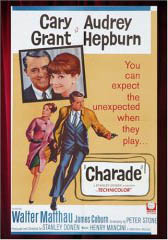 |
Charade.
Charming Regina Lampert (Audrey Hepburn) returns to her home in Paris from a skiing holiday to find that her world had been turned upside down. To begin with, her husband Charles is lying dead in the mortuary, murdered in cold blood. Then, Inspector Edouard Grandpierre (Jaques Marin) of the French Police grills her about a quarter of a million dollars her husband was supposed to have been carrying. CIA agent Bartholomew (Walter Matthau) calls her in for questioning, warning her that the money was stolen by Charles and his friends during World War II and had to be returned to the United States Treasury. Regina doesn’t have the foggiest idea about the money. This is a murder mystery with a difference. Filled with unexpected twists and turns, the narrative has your mind on constant overdrive, trying to figure out how the plot will unfold. More often than not, you are caught on the wrong foot. You start guessing again - only to be outdone by another clever twist in the narrative. Director Stanley Donen’s job was made easy by the star-studded cast.
|
| Sept. 1 |
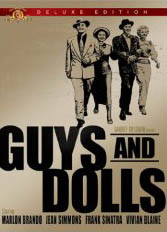 |
Guys and Dolls. Joseph Mankiewicz's brightly stylized film of Frank Loesser's classic musical (based on the stories of Damon Runyon) casts the criminal underworld as a harmless fantasy in this whimsical vision of the Big Apple. Nonsingers Marlon Brando and Jean Simmons acquit themselves fine in the lead roles as high-rolling gambler Sky Masterson and Salvation Army missionary Sarah Brown. It's odd casting, to say the least. Frank Sinatra, who plays the good old reliable Nathan Detroit (who runs "the oldest established permanent floating crap game in New York") is left with novelty tunes while husky Brando delivers the love songs and hits, including "Luck Be a Lady." But in the context of the colorful dialogue and comically affected speech patterns (a giddy gangster-speak straight out of Runyon's breezy stories) the song performances aren't the least out of place. Stubby Kaye, reprising his role as Nicely Nicely from the Broadway run, practically steals the show in his few scenes and his show-stopping solo "Sit Down, You're Rocking the Boat." The film is overlong at two and a half hours and somewhat stagily confined in the stylized, studio-bound sets--perhaps the mark of a director who had never helmed a musical before--but a terrific cast of eccentrics and Michael Kidd's high-energy choreography gives the film a memorable and enchanting character. |
| Sept. 22 |
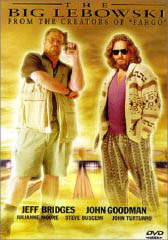 |
The Big Lebowski. The Big Lebowski is every bit a Coen movie, and its lazy plot is part of its laidback charm. After all, how many movies can claim as their hero a pot-bellied, pot-smoking loser named Jeff "The Dude" Lebowski (Jeff Bridges) who spends most of his time bowling and getting stoned? And where else could you find a hairnetted Latino bowler named Jesus (John Turturro) who sports dazzling purple footgear, or an erotic artist (Julianne Moore) whose creativity consists of covering her naked body in paint, flying through the air in a leather harness, and splatting herself against a giant canvas? Who else but the Coens would think of showing you a camera view from inside the holes of a bowling ball, or an elaborate Busby Berkely-styled musical dream sequence involving a Viking goddess and giant bowling pins? The plot--which finds Lebowski involved in a kidnapping scheme after he's mistaken for a rich guy with the same name--is almost beside the point. What counts here is a steady cascade of hilarious dialogue, great work from Coen regulars John Goodman and Steve Buscemi, and the kind of cinematic ingenuity that puts the Coens in a class all their own. Be sure to watch with snacks in hand, because The Big Lebowski might give you a giddy case of the munchies. |
| Sept. 29 |
 |
Moonstruck. Fall under the delightful spell of Moonstruck, the mesmerizing romantic
comedy from director Norman Jewison and Oscar winner John Patrick Shanley. Academy Award winners Cher, Nicolas Cage and Olympia Dukakis excel in this explosively funny tale which also features flawless performances by Danny Aiello, Vincent Gardenia and Frasier's John Mahoney. Cher is devastatingly funny, sinuous and beautiful as Loretta, an Italian widow who finds romance through the intervention of the Manhattan moon. With her wedding to a close friend just weeks away, she meets and falls hopelessly in love with his younger brother (Cage)! Her dilemma and her equally passionate and hilariously eccentric family make for an unforgettable film you'll find beguiling, enchanting and irresistible.
|
HOME | DIRECTIONS
SCHEDULES FOR PREVIOUS YEARS
|

